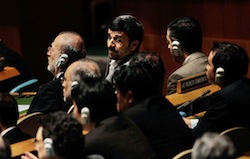Iranian Charade Falls Short
May 10, 2010
Featured Image
Today's top nuclear policy stories, with excerpts in bullet form.
Stories we're following today, Monday, May 10, 2010:
Iranians' Trip to the U.N. Falls Short - The Los Angeles Times [link]
- A top-level Iranian delegation garnered worldwide attention this week with appearances at the United Nations aimed at winning international support for its position on nuclear issues.
- Iranian officials were hoping to demonstrate during a month-long treaty review conference that Iran retains strong support from others, especially in the developing world.
- Analysts suggested that the Iranians had some of the right arguments, but the wrong delivery. "They made some key arguments on disarmament, but the way they wrapped it in anti-Americanism, they kind of missed an opportunity to be taken seriously," said Deepti Choubey of the Carnegie Endowment for International Peace.
Brazil's Opportunity to Close the Nuclear Proliferation Loophole - Bernard Aronson in the Huffington Post [link]
- Nations, like individuals, as the ancient Greeks warned, are often tested by success, as much as by adversity. For the last several years Brazil has been on an international roll.
- [But recently] Brazil has risked its international reputation in recent months due to its policies towards Iran.
- Rather than serve as Iran's enabler or seek the lowest common diplomatic denominator, Brazil should vault itself into a position of leadership by helping close the loophole in the Nuclear Proliferation Treaty (NPT) which Iran, North Korea, and other rogue states have exploited to develop nuclear weapons programs.
- Brazil could fundamentally alter the debate about proliferation by permanently renouncing its right to enrich uranium, closing its enrichment facility, and accepting a long-standing UN proposal [to supply Brazil with the low-enriched uranium it needs.]
- Were Brazil to embrace this proposal before the upcoming Security Council vote -- and call on other developing nations to do the same -- it would isolate Iran dramatically.
'How Long a Wait?' Ban Asks About Nuke Test Treaty - The Associated Press [link]
- An impatient U.N. Secretary-General Ban Ki-moon is pushing to set a deadline for activating the treaty banning all nuclear tests, stepping up pressure in a campaign to win over holdouts, including the U.S. Senate.
- "The bottom line is this: It has been 15 years since the treaty was opened for signature. How long must we wait?" Ban asked delegates at the opening of [the NPT review conference.]
- The Comprehensive Test Ban Treaty would impose a blanket ban on any test anywhere, putting the power of international law and U.N. Security Council enforcement behind the ban.
- Tests help weapon designers build ever more compact, durable and finely tuned bombs. Ending testing would put a cap on developing new weapons, halting proliferation to more states and giving nuclear-armed states more confidence to negotiate deep reductions, treaty proponents say.
- "U.S. ratification is the defining ratification," Toth said, pointing out that China and others would then come along.
Fixing the Treaty - The New York Times [link]
- The world has a chance this month to send a powerful message about its determination to curb the spread of nuclear weapons.
- The [NPT] bargain was always tenuous, and countries that gave up nuclear arms have some right to feel aggrieved. For too long the United States and Russia did little to shrink their huge arsenals.
- President Obama has shown that he is willing to lead by example. He has downgraded the importance of nuclear arms, pledged to build no new weapons, and signed a new arms reduction treaty with Moscow. All five weapons states issued a useful joint statement pledging not to test a weapon and promising to cooperate with countries seeking peaceful nuclear energy programs.
- All states need to ante up and reverse the treaty’s slide. The world’s security depends on it.
Joe Cirincione on Viewpoint with James Zogby - LinkTv [link]
- Joe Cirincione, President of Ploughshares Fund talks with James Zogby about the Nonproliferation Treaty (NPT) Review Conference and the goals of the broader nuclear security agenda.
A View from the Dark Side
Obama's Policies May Spur Nuclear Proliferation - James Woolsey in the Christian Science Monitor [link]
- There are three ways in which I believe recent decisions by the Obama administration are, unintentionally, actually fostering the proliferation of nuclear weapons rather than constraining them.
- The idea is that if the US just continually takes steps in good faith to clarify and reduce the circumstances in which we would use nuclear weapons to protect our allies, then the world may progress toward being nuclear-free.
- However, it seems logical that the incentives would work just the opposite way. US allies could well come to the conclusion that “these Americans are not protecting us the way they did in the cold war, so we better go ahead and get our own nukes.”
- From the standpoint of a Syria, Iran, or North Korea, the fact that the US is holding out the dream of zero nuclear weapons and forswearing modernization even as those states progress toward their own weapons makes the US look more like the weak horse.
- In my judgment, we are not being smart about proliferation by moving in the direction Obama has taken. Proliferation is going to be more, not less, of a problem.



